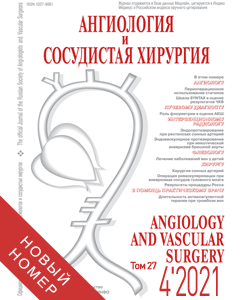Journal «Angiology and Vascular Surgery» •
2000 • VOLUME 6 • №2
ANTITHROMBOTIC EFFICIENCY OF MONO- AND POLYVALENT DRUG THERAPY OF LOWER LIMB DEEP VEIN THROMBOSIS: COMPARATIVE EVALUATION
A.A. Baeshko, G.P. Shoroh, A.G. Kriuchok, S.I. Korsak
The results of conservative treatment of 181 patients with proximal obstructive thrombosis of lower limb deep veins (TLLDV) are presented. In 42 patients (23.6%) TLLDV was complicated by pulmonary arterial thromboembolism (PATE). The TLLDV diagnosis included evaluation of anamnestic data, patient complaints, physical examination, diagnostic imaging (radionuclide and/or contrast radiographic). Coagulation was assessed by: fibrinogen level, activated partial thromboplastin time, Lee-White whole blood clotting time, antithrombin III. Conventional complex antithrombotic medication was given to 91 patients (1st group), heparin monotherapy – to 90 patients (2nd group). Main clinical parameters were similar in both groups. No significant difference in antithrombotic and analgesic effects of both therapeutic modalities was revealed. Hospital stay in the second group was more than two-fold shorter because heparin administration has been restricted to 7 days. The results suggest heparin monotherapy along with the same antithrombotic potential to be significantly beneficial owing to the less hospital stay and lower costs compared to complex drug therapy. For the majority of patients with TLLDV heparin monotherapy was quite effective to normalize blood coagulation system.
KEY WORDS: antithrombotic therapy, lower limb deep vein thrombosis.
P. 67-71
ARCHIVES MAGAZINE
2021 (Vol.27)
2020 (Vol.26)
2019 (Vol.25)
2018 (Vol.24)
2017 (Vol.23)
2016 (Vol.22)
2015 (Vol.21)
2014 (Vol.20)
2013 (Vol.19)
2012 (Vol.18)
2011 (Vol.17)
2010 (Vol.16)
2009 (Vol.15)
2008 (Vol.14)
2007 (Vol.13)
2006 (Vol.12)
2005 (Vol.11)
2004 (Vol.10)
2001 (Vol.7)
2000 (Vol.6)
1999 (Vol.5)
1998 (Vol.4)
1997 (Vol.3)


